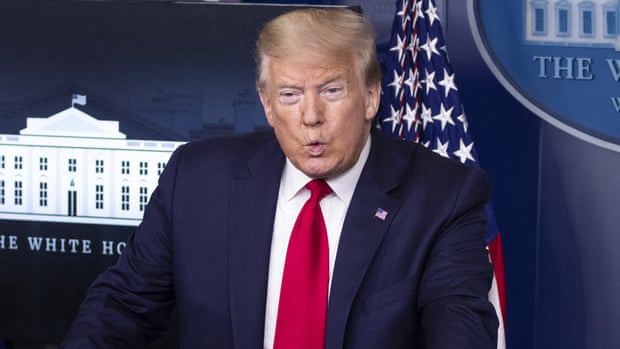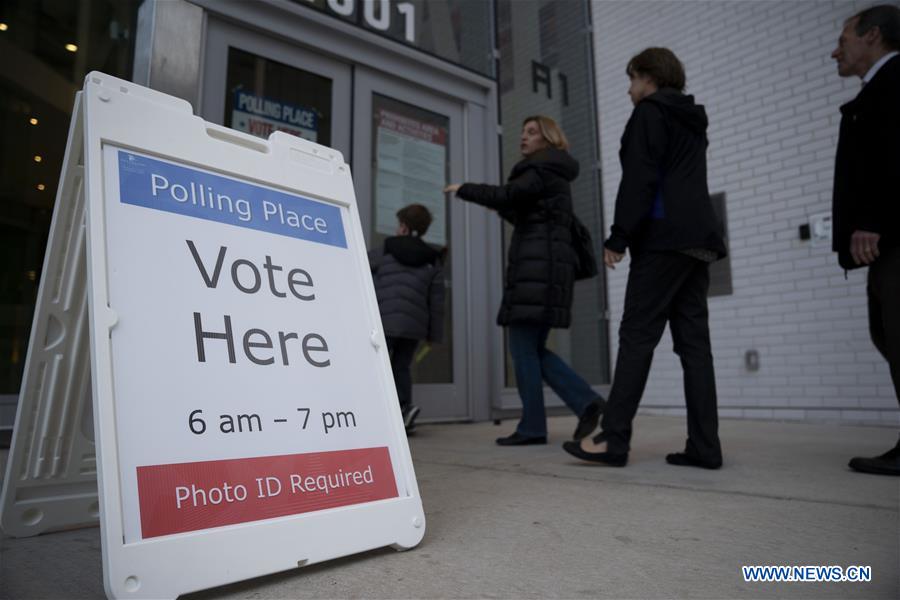
U.S. President Donald Trump in the White House in Washington, D.C. /AP
U.S. President Donald Trump in the White House in Washington, D.C. /AP
Editor's note: Bradley Blankenship is a Prague-based American journalist, political analyst and freelance reporter. The article reflects the author's opinions, not necessarily the views of CGTN.
On Thursday, U.S. President Donald Trump said the quiet part out loud by admitting that his efforts to block funding to the United States Postal Service (USPS) are to suppress voters in November's presidential election. The president's moves against the USPS follow in a long trend of trying desperately to salvage an election that may quickly be slipping out of grasp due to a failed coronavirus response and a failure to address the economic fallout. While Trump has falsely called mail-in voting "fraudulent," the fact remains that higher voter turnout in 2020 bodes poorly for Trump and that's precisely why he's trying to reduce ballot access.
"They want three and a half billion dollars for something that'll turn out to be fraudulent, that's election money basically. They want three and a half billion dollars for the mail-in votes. Universal mail-in ballots. They want 25 billion, billion, for the Post Office. Now they need that money in order to make the Post Office work so it can take all of these millions and millions of ballots," Trump said.
These comments by the president are alarming; they're an obvious attack against American democracy and a clear effort to steal an election already heavily complicated by an ongoing pandemic. Trump would like to see fewer voters go to the polls this time around, which would no doubt happen naturally if it weren't for the option to vote by mail. While the research is split on whether higher voter turnout favors one party or another, in this election it's clear that the Democratic Party is registering an increasing number of voters as a result of the ongoing nationwide protests.
As the New York Times reported based on data compiled by TargetSmart, a Democratic data firm, "In the first half of June, a month when, during an election year, voter registration normally suffers from a summer lull, more than 520,000 Democrats registered to vote." This is almost 50 percent higher than the previous month's total "and a rate that outpaced Republicans in nearly every state during those two weeks."
Republicans have long tried to disenfranchise voters, particularly Black voters and especially those in the South. Voter identification laws, voter roll purges, and arbitrary restrictions on early and absentee voting have been among the most common tactics to keep voters out of the polls. This time, with the coronavirus no doubt in full swing this fall and serving as a deterrent to going to the polls, the goal for Republicans is to keep undesirable voters – especially this wave of new voters – from having access to a ballot by mail.
They're doing this by claiming the process could be ripe for fraud but this claim is complete fiction; there is no widespread voter fraud in the United States. USPS itself, a completely non-partisan agency, has refuted claims the president made against it that somehow the post service couldn't handle the high volume of mail-in ballots.

Voters walk into a polling station during the Virginia primary in Arlington, Virginia, U.S, March 3, 2020. /Xinhua
Voters walk into a polling station during the Virginia primary in Arlington, Virginia, U.S, March 3, 2020. /Xinhua
"The Postal Service has ample capacity to adjust our nationwide processing and delivery network to meet projected Election and Political Mail volume, including any additional volume that may result as a response to the COVID-19 pandemic," the agency said in a statement.
Republicans have for decades launched an attack against all American social institutions to discredit them as unreliable; the USPS is just one example. In particular with the postal service, they've in recent years lambasted the agency for struggling financially in a situation they themselves actually created.
In 2006, former Republican president George W. Bush signed the Postal Accountability and Enhancement Act (PAEA) – the first major overhaul of the totally functional postal service since 1970. The act imposed seemingly well-intentioned retiree pension and benefit contribution rules that were in fact totally unsustainable for the USPS.
After the legislation went into effect, the postal service was required to calculate all of its assumed pension costs over the next 75 years and stash it between 2007 and 2016 – something virtually no other government agency or company would or could ever do. By 2012, the USPS was defaulting on its PAEA payments because of the high burden imposed by the Bush regulations.
"It is equivalent to impose a tax of eight percent on the Postal Service's revenue," economist Dean Baker told Congress in 2013. "There are few businesses that would be able to survive if they were suddenly required to pay an eight percent tax from which their competitors were exempted."
The goal by Republicans was to privatize the USPS or drive it out of business to make way for private corporations to capitalize, which is a common theme for many American social institutions that have been gutted by supply-side ideologues. Tried as they did, however, even in April of this year, the USPS remains the American public's most popular government agency. The fact is that the agency is fully competent and would be more than able to handle mail-in voting during the election cycle if properly funded.
Trump himself has voted absentee three times since being president and has said he will do so again in 2020 (mail-in voting and absentee voting are the same). He even tried to have it both ways recently by encouraging Florida voters to vote by mail because "in Florida the election system is Safe and Secure" thanks to their Republican governor. Attacks by the president against the postal service are self-evidently hypocritical and deserve no serious consideration.
The problem is not voter fraud nor is it the postal service's incompetence – it's simply another attempt by President Trump to steal the election.
(If you want to contribute and have specific expertise, please contact us at opinions@cgtn.com.)